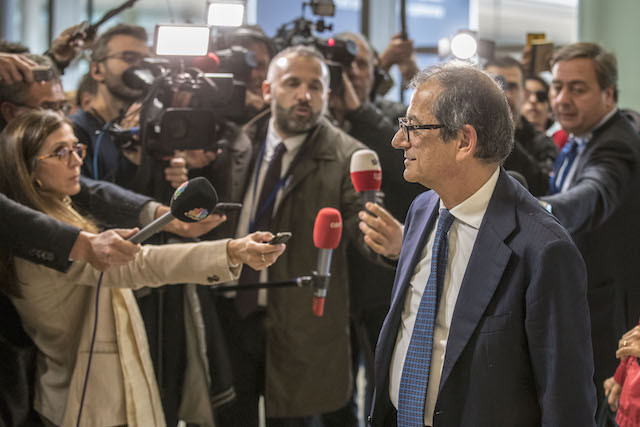Rome set to clash with Brussels over Italian budget
Italy’s government told the European Commission that it would not revise its draft budget, which includes spending that breaks European fiscal rules, reported the Financial Times. Rome says stimulus is needed to jump-start the Italian economy, and would not destablise the euro. Brussels is expected to reject the plan today. CNBC explains what could happen next. The head of the Eurogroup, Mario Centeno, told Reuters that he expects the two sides to reach an agreement.
Washington set to clash with Moscow over 1980s nuclear missile accord
Moscow said it would be forced to “balance” (that is to say, build up) its nuclear missile arsenal if Donald Trump carried out his threat to withdrawal the US from the 1987 Intermediate-Range Nuclear Forces Treaty, reported Reuters. The Russian government also said it was open to discussing Washington’s grievances. Trump reiterated his belief that Russia has violated the agreement and could launch a massive missile-building programme, according to the BBC. European leaders have lobbied against a US withdrawal, reported the Guardian. DW has a backgrounder on the INF treaty.
Germany suspends Saudi weapon sales
The German chancellor, Angela Merkel, said Berlin would suspend arms sales to Saudi Arabia following the killing of the dissident journalist Jamal Khashoggi. Reported by Bloomberg, DW and the Financial Times.
Brexit: May tells UK House of Commons to hold nerve
The British prime minister, Theresa May, said Brexit talks with Brussels were “95%” complete and told MPs that: “Serving our national interest will demand that we hold our nerve through these last stages of the negotiations, the hardest part of all,” according to the AP, Guardian and Reuters. May outlined her four tests before signing an interim agreement on an Irish border, the last major hurdle.
World’s longest sea crossing opens in southern China
Chinese leaders inaugurated the Hong Kong-Zhuhai-Macau Bridge, reported the BBC, Financial Times and South China Morning Post. The 55km structure connects the two semi-autonomous regions with the mainland. It is meant to boost economic growth in the Pearl River Delta (and show off China’s engineering capabilities). The $20bn project was completed about two years behind schedule.
Ryanair profits down 7%
The Irish budget airline Ryanair reported lower profits for the six months to September despite higher traffic, reported the Financial Times, Guardian and Irish Times. Ongoing labour disputes and higher fuel costs hit margins. The carrier’s CEO, Michael O’Leary, forecast a rough winter, but said that he hoped to reach deals with all trade unions by Christmas. Ryanair’s shares closed higher.
Netflix raises more debt to fund programming
The video streaming service Netflix issued $2bn in bonds to invest in new content, reported the Guardian, MarketWatch and Reuters. The company now owes more than $30bn; its market capitalisation is more than $145bn. The $2bn offer was rated as speculative (“junk”) by credit agencies and Netflix shares were down.
Democratic deficit
The current print edition of The Economist described, in an article titled “Taxation without representation”, how 48% of Luxembourg residents did not vote in this month’s parliamentary elections. The magazine explained the “rare” and failed move to give foreigners a vote (in a 2015 referendum rejected by 78% of Luxembourg voters). The story finished with the observation: “In just a few years, eligible voters will be a minority” of the population.
